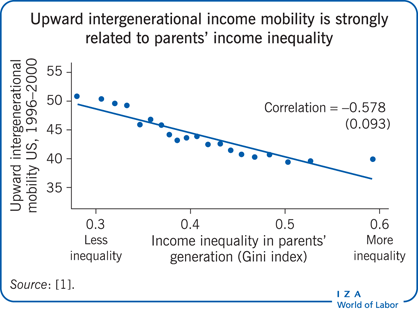Elevator pitch
Income inequality has been rising in many countries. Is this bad? One way to decide is to look at the change in incomes across generations (intergenerational mobility) and, more generally, at the extent to which income differences among individuals are traceable to their social origins. Inequalities that reflect factors largely out of one’s control—such as local schools and communities—require attention in order to reduce income inequality. Evidence shows a negative association between income inequality and intergenerational mobility. The debate on whether community effects exert additional effects is still open.
Key findings
Pros
Promoting greater intergenerational mobility may increase equality of opportunity.
Policies that foster intergenerational mobility may incentivize human capital investments and productive effort.
Youth communities (school and neighbors) seem to play a limited role in determining inequality in the long term, but the evidence is not conclusive.
Even if a large part of intergenerational transmission of income is due to genetic factors, policies may still have an effect in reducing inequality.
Cons
Income differences reflect individual effort, and redistributive policies could curb individual incentives.
Growing income inequality may increase social segmentation and reduce equality of opportunity.
Income differences between individuals in a generation reflect to a significant extent differences between their parents.
A non-negligible share of intergenerational transmission is ascribable to genetic factors.
Countries with high income inequality tend to have low intergenerational mobility.
